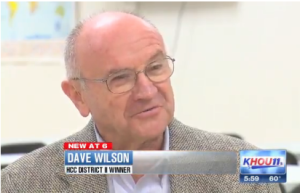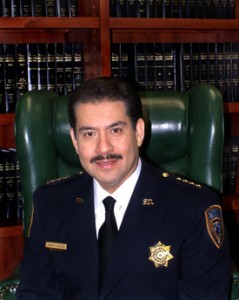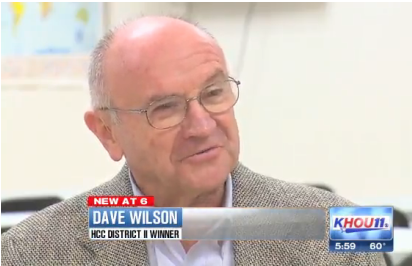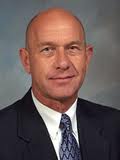(Note: As I have done in past elections, I am running a series of Q&As for judicial candidates in contested Democratic primaries. This is intended to help introduce the candidates and their experiences to those who plan to vote in March. I am running these responses in the order that I receive them from the candidates. You can see all of my interviews as well as finance reports and other information on candidates on my 2014 Election page.)

Jim Evans
1. Who are you and what are you running for?
My name is Jim Evans, and I am running for the position of Judge in the 308th Family District Court.
2. What kind of cases does this court hear?
This court, like each of the nine Harris County family district courts, hears family law matters such as divorces, child custody disputes, child support cases, child support enforcement actions, name changes, and adoptions.
3. Why are you running for this particular bench?
I am running for this bench because I am qualified to do the work required of a judge and because I am passionate about doing that work with integrity and with an understanding of the enormous consequences of my decisions.
Furthermore, I am running for this bench because it belongs to the people of Harris County, and it should not be used as a means to provide financial benefits to my political benefactors and cohorts. The presiding judge in this court has the ability to appoint ad litem attorneys, amicus attorneys, and receivers in hundreds of cases each year. The current Republican presiding judge, James Lombardino, appoints almost exclusively people who have donated to his campaign. Additionally, in the three years that he has been on the bench, he has appointed Jared Woodfill, the Harris County Republican Party chairman, numerous times (and more than any other family judge in Harris County). This sort of favor is inappropriate and not in the best interest of the children who are the subjects of the cases before the court.
4. What are your qualifications for this job?
I understand Texas family law, the culture of Harris County, and the legal environment in Harris County. I am a Harris County native, a graduate of Houston Baptist University, and the University of Houston Law Center. I have practiced law for over 10 years. For the last five years, I have practiced family law almost exclusively. I know the family judges in Harris County, the family attorneys in Harris County, and the statutory and common law bases for family law decision-making in Texas. I currently maintain my law practice in downtown Houston.
While in law school, I graded onto and served as the Research Editor on the Houston Law Review, which shows that I am diligent and a hard worker. At the beginning of my legal career, I practiced chapter 7, 11, and 13 bankruptcy law, so I have a necessary understanding of the complicated property issues that sometimes arise in divorces. In 2009, I obtained certification as a family law mediator, and I understand the value and the limitations of mediation as a tool that can be used to resolve family law disputes.
Prior to attending law school, I taught in Louisiana public schools and worked as a Baptist minister for a number of years serving churches in Texas, Maryland, and Louisiana. These prior careers gave me an appreciation of the enormity of the pressures that people face with regard to their family lives and decision-making. This appreciation will inform my rulings on the bench as I strive for fairness and justice.
I have a life outside of the practice of law, and I believe that this will help me make decisions that are practical and that have good long-term results. I am a parent, divorced parent, step-parent, and adoptive parent. I married my husband, William Flowers, in Connecticut in 2010. I teach Sunday School at Deer Park United Methodist Church, and I serve on the church’s Staff-Parish Relations Committee.
5. Why is this race important?
If elected, I will be the first openly gay family judge in Texas (and probably the first in the South). While this, in and of itself, does not qualify me to be a family judge, it will be significant to have an openly gay person on the bench. Currently, the family courts in Harris County negatively discriminate against gay and lesbian people. For example, none of the family judges, all of whom are Republican, will grant an adoption in a case where the prospective adoptive parent is an “out” gay or lesbian. If I am elected, I believe it will create a moral imperative for the other judges to do the right thing and either grant or deny an adoption based on the best interest of the child instead of the sexual orientation of the prospective adoptive parent. Moreover, my promise, if I am elected, is that I will do nothing for the gay community except that I will not discriminate based upon a litigant’s sexual orientation.
6. Why should people vote for you in the primary?
People should vote for me in the primary because I am energetic and a hard worker as evidenced by my successful campaign efforts collecting almost 1300 signatures on my petition to be placed on the ballot; and I intend, if I win the Democratic primary election, to work hard and run a winning general election campaign.
Additionally, I believe that my candidacy in the general election will inspire greater volunteerism and voter turnout for me and other Democratic candidates among members of the Houston GLBT community. This is particularly so because, if I am elected, I will be the first openly gay family district judge in Texas. I have already personally spoken to over one thousand GLBT people in Houston about this possibility; and their response is universally positive and enthusiastic.
Democrats in Harris County know that our county is fairly evenly split between Democrats and Republicans. Moving even a few thousand voters from the Republican column to the Democratic column could have a significant impact on election night. I am a native of and a current resident of Deer Park, generally considered to be a Republican stronghold. I have already done block walking in parts of Deer Park and have found many Democrats who are discouraged because they believe that they are the only Democrats in town; I have also found Republicans who are excited about the possibility of voting for a Deer Park “local boy.” If I win the primary, I will consider it my job to get Deer Park Democrats to vote and to get Deer Park Republicans to cross the aisle and vote for me and other Democrats on the ballot. I believe that my intentional efforts to engage with Deer Park people will yield those successful results.
Finally, while my opponent is a good man and a good attorney, between the two of us, I am the only strong Democrat.



























